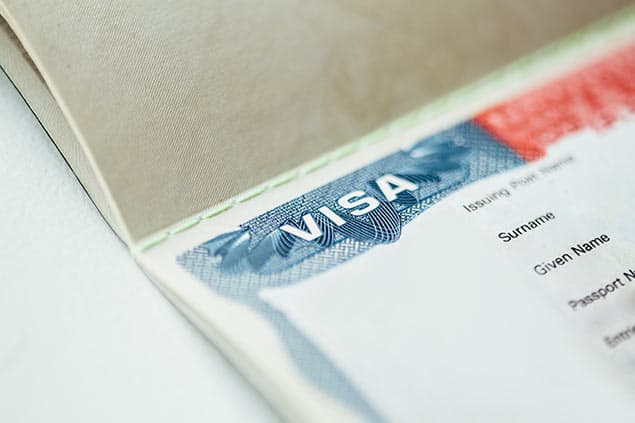H-1B Regulatory Requirements and Updates
Thursday | December 1, 2022 | by Lucy Cheung

Many international students and scholars in the U.S. hope to find employment in the U.S. that will allow them to gain the skills needed to secure permanent work. For most graduates, the H-1B non-immigrant visa category is a natural progression after Optional Practical Training (OPT) or employment as a contractor. This is because many international students will graduate with at least a bachelor’s degree. Others may have already earned an equivalent degree from their native country.
H-1B Basics
H-1B visas must be filled by people with specific skills and qualifications needed by their employers. Individual applicants may not apply for these specialized work visas. Instead, employers must petition the U.S. Citizenship and Immigration Services (USCIS) for H1-B visas on behalf of the applicants they want to hire as permanent workers.
Because your employer technically files the H-1B petition, you will need cooperation from your employer every step of the way.
Since 2019, the U.S. Department of Homeland Security (USDHS – the parent agency of USCIS), has required employers to submit an electronic registration for each person seeking an H-1B visa. Once this registration period has ended, a randomized selection process (referred to as a “lottery”) takes place, and only those registrations selected through the lottery may file an H-1B petition.
To file a successful application, an employer must meet certain requirements. Namely, the employer must demonstrate that the job for which they’re recruiting qualifies as a “specialty occupation” (Employers and their immigration attorneys must conduct their own research and utilize available government and non-government resources to make this case.)
NOTE: While most employers are subject to this registration system, some organizations may be exempt if they meet certain requirements. These employers are often referred to as “cap-exempt employers.”
What Is a “Specialty Occupation”?
According to U.S regulations, a specialty occupation is one that requires the application of highly specialized knowledge. As a minimum for entry, such occupations require a bachelor’s degree or higher (or its equivalent) in a specific specialty.
To qualify as a specialty occupation, the job you’re seeking must meet one of the following requirements:
- A bachelor’s or higher degree or its equivalent is normally the minimum entry requirement for the position.
- The degree requirement for the job is common to the industry or the job is so complex or unique that it can be performed only by an individual with a degree.
- The employer normally requires a degree or its equivalent for the position.
- The nature of the specific duties is so specialized and complex that the knowledge required to perform the duties is usually associated with the attainment of a bachelor’s or higher degree.
NOTE: As political administrations change, the review process of H-1B (and other immigration) petitions can shift from relaxed to restrictive, and vice-versa. According to a USCIS report, more than half of the H-1B petitions filed in the first three months of 2019 received a Request for Evidence (RFE). Employers need to be prepared to respond if an RFE is issued. Because RFEs come with a deadline to respond, it is important that thought is given to the specialty occupation eligibility requirements listed above when the H-1B petition is prepared. Even with employers who are willing to go through the challenging process of filing for the H-1B, there are many things to consider getting to the ultimate endpoint: an H-1B approval.
How to Make a Good Case for an H-1B Classification
Especially during periods when USCIS is restrictive in its review of cases, it is a good idea to speak with a knowledgeable immigration attorney to familiarize yourself with the detailed requirements for H-1B visas. There are different times when it makes sense to do this:
- When you are a student. Knowing the requirements for H–1B visas is valuable even before you apply for certain positions.
- When you are already working for an organization, whether on an OPT visa or under a contract agreement. If you have a willing employer who wants to hire you as a permanent worker, you can ask your employer or the HR manager to contact or join you at a meeting with the attorney.
TIP: For existing jobs, try to find out if each employee who held the position before you have had similar degrees, or if the employer has always required someone with a specific degree to fill the position. Every employer is different in terms of structure and familiarity with the immigration process. Check early, so you can prepare!
Final Tips
Having a job that is a specialty occupation, as well as the qualifications to perform that job, are only some of the elements of a successful H-1B petition. You must also:
- closely follow USCIS’ H-1B deadlines, including the electronic registration and the ensuing filing period if selected
- ensure your employer files and receives a timely certified application from the Department of Labor
- ensure your employer has the correct information to file a complete and accurate H-1B petition.
Don’t forget: Check with your employer and a knowledgeable immigration attorney early in the process. Although the immigration climate can be challenging, one of the keys to a successful H-1B petition is proper planning and preparation.
Related Reading
The views and opinions expressed in this article are those of the author(s) and do not necessarily reflect the official policy or position of World Education Services (WES).
